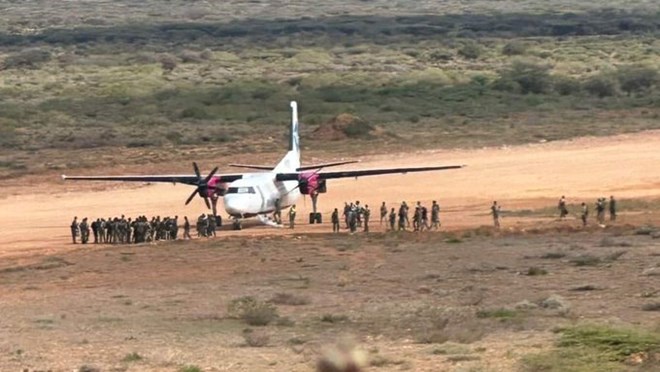
Friday December 6, 2024

Somalia's Federal Leaders in Focus (from right to left): Prime Minister Hamza Abdi Barre, President Hassan Sheikh Mohamud, and Jubbaland President Ahmed Madobe
The immediate trigger for the conflict lies in the contentious reelection of Jubbaland President Ahmed Mohamed Islam, commonly known as Madobe, on November 25. Madobe secured a third term after Jubbaland's parliament abolished term limits earlier this year. The FGS refused to recognize the results, calling the election illegal and accusing Madobe of overstaying his mandate.
advertisements
The dispute stems from deeper disagreements over Somalia's electoral framework. In October, the National Consultative Council (NCC)—a platform for the FGS and federal member states—agreed to adopt a one-person, one-vote system for the 2025 elections. Jubbaland and Puntland boycotted the talks, claiming the system would undermine their autonomy. Madobe has since accused Mogadishu of using electoral reform as a pretext to consolidate power.On the same day as Madobe's reelection, FGS forces deployed to the border town of Ras Kamboni, a strategic town near the Kenyan border, under the pretext of fighting al-Shabaab. However, the deployment's timing suggests it was intended to counter Madobe's political defiance.
Somali troops and Jubbaland forces briefly exchanged gunfire, highlighting the deep mistrust and discontent between Jubaland and Somalia's central government.
Madobe issued a 15-day ultimatum for FGS forces to withdraw from Ras Kamboni, warning that failure to comply would result in "serious consequences." In response, Somali Defense Minister Abdulkadir Mohamed Nur vowed that federal forces would not back down, escalating fears of prolonged violence in the region.
Ethiopia has long maintained a military presence in Jubbaland, ostensibly to support counterterrorism operations. However, recent reports suggest Ethiopia is leveraging its presence to support factions opposed to the FGS — including detaining Somali soldiers in Gedo.

Federal Government of Somalia (FGS) troops disembark at Ras Kamboni airport amidst heightened tensions with Jubbaland forces over disputed elections and regional autonomy
Ethiopia's broader regional strategy has led Somalia to strengthen ties with Ethiopia's geopolitical rivals, Egypt and Eritrea.
Egypt, which began delivering arms to Somalia in August, has framed its military partnership as part of the fight against al-Shabaab. However, Ethiopia sees Cairo's involvement as a strategic threat tied to their longstanding dispute over the Grand Ethiopian Renaissance Dam (GERD). The heavy weaponry sent by Egypt, including anti-tank and anti-aircraft systems, raises questions about its intended use, particularly as Ethiopia has hinted at maintaining its forces in Somalia beyond the December 2024 ATMIS withdrawal deadline.
In October 2024, the presidents of Somalia, Egypt, and Eritrea convened in Asmara to form a trilateral alliance to counter Ethiopia's growing influence in the Horn of Africa. The strategic partnership signalled a major shift in regional dynamics.
Eritrea's involvement in the trilateral alliance with Somalia and Egypt reflects its unaddressed grievances with Ethiopia, particularly over border disputes and regional influence. The Eritrean–Ethiopian War from 1998 to 2000, primarily over the town of Badme, resulted in tens of thousands of deaths and left relations strained for years. Although a peace agreement was signed in 2018, normalizing diplomatic relations, mutual distrust is high.
The Jubbaland-FGS conflict threatens to become a proxy battleground for regional powers. Ethiopia, determined to maintain its influence in Somalia, has signalled its intention to retain troops beyond the December 2024 ATMIS withdrawal deadline. Jubbaland and South West State leaders have openly opposed the FGS's call to expel Ethiopian forces, highlighting the divide within Somalia's federal structure.
Efforts to mediate the conflict have so far failed. Kenyan officials met with Jubbaland leaders and Somali Prime Minister Hamza Abdi Barre in November, but no tangible progress was made. The African Union and United Nations have issued calls for restraint, but neither Jubbaland nor the FGS appears willing to compromise.
Jubbaland has further heightened tensions by suspending flights to Ras Kamboni this week, citing security risks. The FGS has warned that Madobe's defiance undermines national unity and could embolden other regions to challenge the central government's authority.